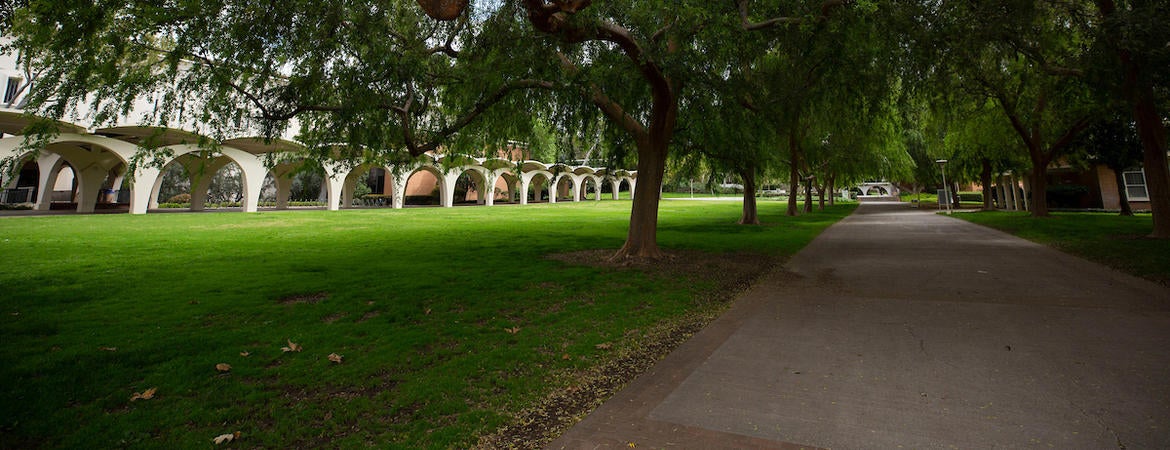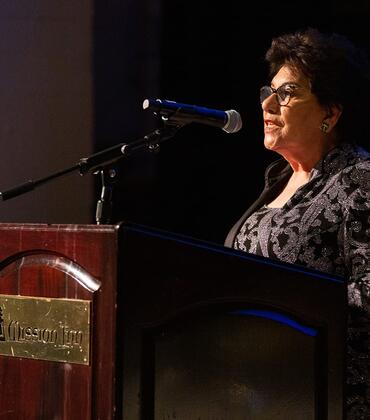
In an unprecedented situation that offered little time for preparation, teams across the UCR community have mobilized to move spring quarter courses and support services online.
The campus was closed to all but the most critical functions on March 13 to mitigate the spread of COVID-19, directly before finals week of the winter quarter, necessitating finals for roughly 3,000 courses be swiftly moved online and all spring classes adjusted to be taught remotely for the duration of the quarter.
The Exploration Center for Innovative Teaching & Engagement, or XCITE, is assisting with UCR’s sudden transition to remote learning platforms. XCITE is a new unit within Undergraduate Education that formed in November to assist faculty with course development and technology integration.
“We would typically have months, if not years to prepare for such a transition, and we are trying to do it in a couple of weeks; it’s a very large task to be undergoing,” said Richard Edwards, director of XCITE. “We convened multiple task forces very quickly and there is a lot of cooperation across campus from deans, the Faculty Senate, ITS, many of the student support units, dean of students, vice provost, vice chancellor of Student Affairs — it really takes a lot of people coming together very quickly to make any of this possible.”
Edwards said the campus is on target for closing out the winter quarter, with all finals successfully moved online to the learning management system iLearn and completed remotely. The next phase is moving spring quarter courses to iLearn, as well as running webinars and trainings for using available resources.
“We’re putting a lot of people on the job of helping get all of these courses put online as rapidly as possible and with as much quality as possible,” Edwards said.
XCITE personnel will be available to assist in media production for the faculty, help instructors develop and design their courses, and will also be coordinating with teams in the library from Teaching and Learning Services.
In addition to iLearn, the video conferencing software Zoom will be used to facilitate interactions with faculty and students. Over 4,000 Zoom Pro licenses have been issued in response to the move to remote learning and UCR’s Information Technology Solutions team, or ITS, has worked to expand the capabilities of iLearn to accommodate the surge in traffic and needs of faculty and students.
Edward’s team is also looking into resources for online proctoring and teaching lab sections. They are considering several services that could provide virtual labs, and resources through the library, such as the Journal of Visualized Experiments, are already available. Research operations deemed critical will be allowed to continue on campus with researchers following proper social distancing and hygiene measures. For fine art and performing art courses, XCITE is collaborating with faculty and departments to find alternatives to in-class instruction.
“This is just emergency remote teaching, so we really have to go forward with the platforms that are already in widespread use and have already been cleared for accessibility and have support by trained people in ITS,” Edwards said.
UCR has implemented the Loan2Learn, or L2L, program, which is offering loaner devices to students without access to laptops, desktop computers, or tablets to support remote teaching and learning. For students without access to Wi-Fi, a limited number of Sprint hotspots have been made available to loan through ITS and several companies have announced plans to offer free internet service to students for 60 days.
Other important facets of campus life will also be moved online. Teams in Undergraduate Education are guiding student-facilitators involved in the R’Course program, which allows students to develop and teach their own courses, in how to structure online courses and teach online. First-generation students will also be able to partake in bi-weekly chats on Tuesdays and Thursdays from 8-9 p.m. through April 30, offering online learning tips, information about accessing student services, and the opportunity to connect with other students.
“Undergraduate Education as a whole is engaging across campus,” said Tom Dickson, assistant vice provost of Undergraduate Education, “We’re working to convert first-year writing courses from University Writing Programs, to provide virtual student academic assistance via the Academic Resource Center, through XCITE to help faculty convert their courses to online formats, and through the vice provost and dean to identify and reduce policy and procedure barriers to student success.”
Student Affairs is also working to shift its services to remote operations. The Student Health Center, Counseling & Psychology Services, and Residential Life staff are available for students who are still on campus. Some services, such as telehealth, are being implemented to reduce contact. R’Pantry, which offers food to students experiencing food insecurity, is offering a limited supply of gift cards and can be accessed by appointment.
“Our goal is to continue providing resources and support to our students and staff during these challenging times,” said Brian Haynes, vice chancellor for Student Affairs.
Information hubs include the websites Keep Teaching for faculty and Keep Learning for students, both of which were developed in direct response to COVID-19. In addition to several guides and webinars for remote teaching and using available resources, Keep Teaching is continually updated to provide the most up-to-date information for instructors. Similarly, Keep Learning provides students guidance for using iLearn and Zoom, tips for successful remote learning, and continual updates regarding campus operations.
“This is an unprecedented situation in American life — we’ve never had anything like this in our history, and so it’s really important to keep trying to communicate with all the stakeholders, from the students, to the faculty, to the leadership, to the various types of third-party solutions, as the information can change by the day,” Edwards said.
Edwards notes that despite challenges, there are advantages to conducting classes remotely, such as the ability for students to learn at their own pace, re-watch lectures, and access materials easily online.
He also believes online learning can provide new opportunities for students to connect with faculty and one another.
“I think a properly set up remote teaching course can have more peer-to-peer interaction than even a face-to-face course because some students who may not want to speak in front of 500 students in a giant lecture hall might be willing to answer a discussion question on iLearn,” Edwards said. “I think you are going to find there is really a lot of value just in this community that comes together.”
Edwards is optimistic about the spring quarter and shift to remote teaching and learning, noting UCR’s innovative faculty and commitment to social mobility and student success.
“This is just teaching at the end of the day despite the format of it being delivered through iLearn, and I think students are still going to get a great value from these course sections over the spring quarter,” Edwards said. “We have to be patient and filled with good will because everyone is working very hard for the faculty and students to have a very positive experience in a time that is absolutely a monumental struggle for society.”



